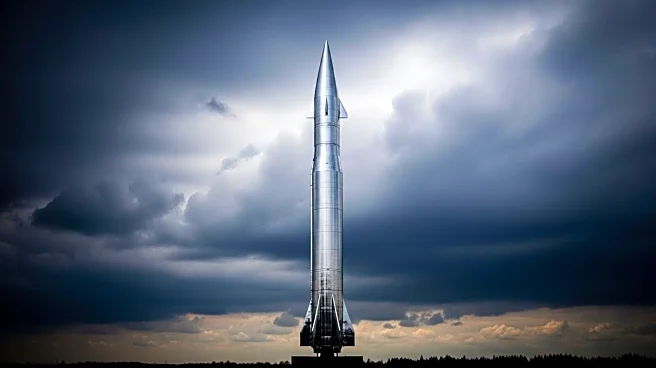What's Happening?
Russian President Vladimir Putin has declared that a global nuclear arms race is currently underway, involving major world powers such as the United States. During a news conference, Putin emphasized Russia's readiness to test nuclear weapons if other countries proceed with similar actions. He highlighted Russia's advancements in nuclear deterrence capabilities, asserting that they surpass those of any other nation. Putin also mentioned that Russia is developing new weapons of deterrence, suggesting that the extension of a key arms control treaty with the U.S. is not critical for Russia. This statement comes amid strained relations between the U.S. and Russia, with recent Russian strikes on Ukrainian energy facilities leaving over a million homes without power.
Why It's Important?
The acknowledgment of an ongoing nuclear arms race by President Putin underscores the escalating tensions between nuclear powers, particularly the U.S. and Russia. This development could have significant implications for global security and arms control efforts. The potential for nuclear tests by Russia, in response to similar actions by other countries, raises concerns about the stability of existing arms control agreements. The situation also highlights the geopolitical challenges faced by the U.S. in managing its relationship with Russia, especially in light of recent military actions in Ukraine. The broader impact on international diplomacy and security frameworks could be profound, affecting global peace efforts and strategic alliances.
What's Next?
If the U.S. or other countries proceed with nuclear tests, Russia's readiness to follow suit could lead to a new phase of nuclear arms development and testing. This scenario may prompt international calls for renewed arms control negotiations and efforts to prevent further escalation. The U.S. and Russia may face increased pressure from global stakeholders to engage in diplomatic discussions aimed at stabilizing their nuclear relationship. Additionally, the international community may seek to address the humanitarian impact of military actions, such as those affecting Ukraine's energy infrastructure, through diplomatic channels and aid initiatives.
Beyond the Headlines
The potential resurgence of nuclear testing and arms development could have long-term implications for global security and environmental health. The ethical considerations surrounding nuclear weapons testing, including the impact on human populations and ecosystems, may become a focal point for international advocacy groups. Furthermore, the geopolitical dynamics between the U.S. and Russia could influence other nations' nuclear policies, potentially leading to shifts in global power structures and alliances. The cultural and historical context of nuclear arms races may also be revisited, prompting discussions on the lessons learned from past conflicts and the importance of maintaining peace.









